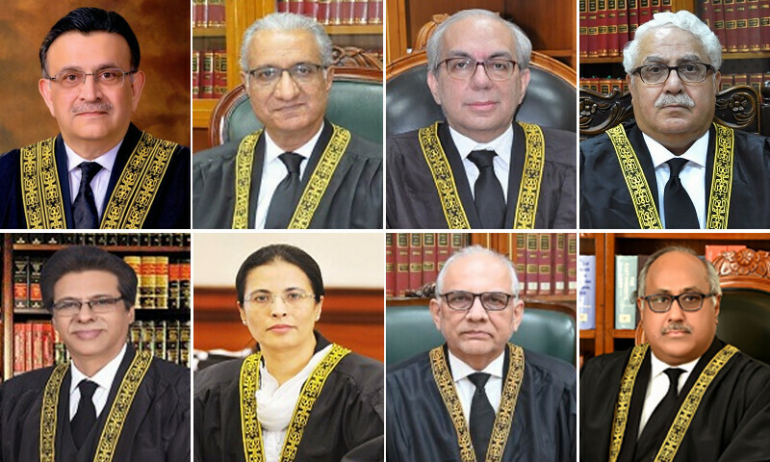An eight-member larger bench of the Supreme Court (SC) will resume hearing on the petitions challenging a bill aimed at limiting the chief justice of Pakistan’s (CJP) powers on May 2 (Tuesday) at 12:30pm.
The eight-member bench will comprise CJP Umar Ata Bandial, Justice Ijazul Ahsan, Justice Munib Akhtar, Justice Sayyad Mazahar Ali Akbar Naqvi, Justice Muhammad Ali Mazhar, Justice Ayesha Malik, Justice Syed Hasan Azhar Rizvi and Justice Shahid Waheed.
The three petitions were filed under Article 184(3) of the Constitution by Advocate Muhammad Shafay Munir, Raja Amer Khan, Chaudhry Ghulam Hussain and others.
The Supreme Court (Practice and Procedure) Bill 2023 is initially passed by both the houses and sent back by President Arif Alvi twice considering it “beyond the competence of Parliament”.
Subsequently, the bill was adopted by a joint session of parliament along with some amendments.
However, while hearing the set of three petitions challenging the bill, the eight-member apex court bench on April 13 ruled that after the bill received either the president’s assent or it was deemed to have been given, the act that “comes into being shall not have, take or be given any effect nor be acted upon in any manner” — halting the law’s implementation when the bill came into effect.
The ruling alliance had already rejected a larger bench of the Supreme Court hearing a case pertaining to the bill passed by both the houses of the Parliament for limiting the power of the chief justice of Pakistan regarding suo motu notices and constitution of benches.
In its joint statement, the coalition parties in the government said the apex court’s move to from 8-member “controversial bench” even before the completion of legislative process was unprecedented in the country’s history and conduct of judicial proceedings.
“This act is tantamount to damaging the credibility of the superior court besides making the process of justice meaningless,” it said
The bill is aimed at limiting the powers of the CJP regarding constitution of benches and suo motu notices.
The proposed law states that every cause, matter, or appeal before the apex court would be heard and disposed of by a bench, constituted by a committee made up of the chief justice and the two senior-most judges.
The legislation also includes the right to file an appeal within 30 days of the judgement in a suo motu case and that any case involving constitutional interpretation will not have a bench of fewer than five judges.
The bill seeks to allow former prime minister Nawaz Sharif and other parliamentarians disqualified by the Supreme Court under suo motu powers (such as Jahangir Tareen) to appeal their disqualification within 30 days of the law’s enactment.



